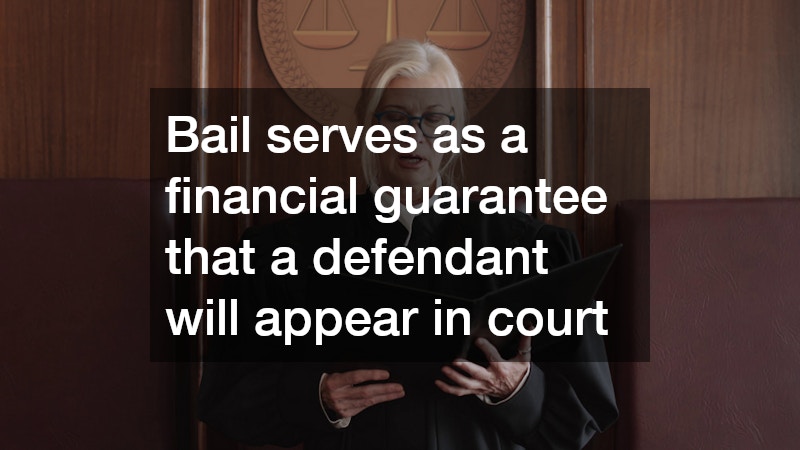Explore the intricacies of bail and establish a comprehensive understanding of how it operates within the legal system. Bail is a crucial aspect of the criminal justice process, affecting both defendants and their families. Whether you are encountering legal troubles or just seeking information, these thoughts from a bail bond service can help clarify common questions about bail.
What Is Bail and How Does it Work?
Bail serves as a financial guarantee that a defendant will appear in court for their scheduled hearings. When someone is arrested, the police may bring them before a judge, who determines whether bail is appropriate based on the circumstances of the case.
The primary goal of bail is to ensure that defendants do not flee from the legal process while still allowing them the freedom to manage their affairs and prepare for their defense.
The mechanics of the bail process typically begin when a judge sets bail. This amount can vary significantly based on several criteria, including the type of offense, the defendant’s ties to the community, and their criminal history. Once bail is set, the individual must either pay the total amount directly or arrange for a bail bond, which is usually a percentage of the total bail amount paid to a bail bond agent.
Understanding how bail works highlights its role within the judicial system as a mechanism for balancing the rights of the accused with the necessity to ensure their presence during court proceedings. This aspect of the legal process is vital to maintaining the rule of law, as it underscores the presumption of innocence until proven guilty.
How Is Bail Amount Determined?
The bail amount is determined through a combination of factors that judges weigh before making a decision. One significant factor is the severity of the crime; more serious offenses often lead to higher bail amounts. For example, violent crimes typically come with steep bail, while misdemeanors may result in a lower financial requirement.
Another consideration for determining bail is the perceived flight risk of the defendant. Judges often examine the individual’s past behavior, including any history of skipping court dates or failing to comply with legal requirements. Additionally, personal circumstances such as prior criminal history, stability in the community, and family ties may influence the judge’s decision.
Judicial discretion plays a critical role in establishing bail, as each case is unique. This discretion, combined with standardized guidelines in jurisdictions, allows for a balance between individual circumstances and the broader interests of public safety and judicial integrity. Every decision aims to ensure that those entrusted with the court’s proceedings can uphold justice effectively.
What Are Bail Bonds and How Do They Function?
Bail bonds are financial instruments that allow defendants to secure their release from custody without paying the full bail amount up front. Instead, a bail bond agent will post the bail on behalf of the defendant in exchange for a non-refundable fee, generally ranging from 10% to 15% of the bail amount. This service can be particularly beneficial for those unable to afford the total bail requirement.
The role of bail bond agents is crucial during this process. They assess risk, collect necessary personal information from defendants, and establish payment plans to facilitate the bond arrangement. By doing so, they help ensure that defendants can return to their daily lives while awaiting court proceedings, transitioning support into a legally recognized agreement.
Once a bail bond is secured, it creates a contractual obligation for the defendant to appear at all scheduled court dates. If the defendant fails to comply with this obligation, the bail bond agency may take legal action to recover the financial loss incurred by posting the bail. This structure emphasizes the need for compliance with court requirements while providing a pathway to secure freedom prior to trial.
What Happens if You Can’t Afford Bail?
For many, the inability to pay the full bail amount can be a significant barrier to freedom after an arrest. However, there are several alternatives available to those who find themselves in this situation. One common solution is to seek the assistance of a bail bond agent, who can facilitate a bail bond to cover the cost while charging a percentage of the total as a fee.
In some cases, defendants may also qualify for release on recognizance, which allows them to leave custody without posting bail. This option is typically available for individuals with no prior criminal history, those charged with less serious offenses, or individuals who pose minimal flight risks. By demonstrating strong community ties or other mitigating factors, defendants can often secure this type of release.
Understanding these options can empower individuals and their families during a challenging time. It is essential to communicate effectively with legal representatives and explore all available avenues for securing release from custody. This knowledge can have a significant impact on the outcome of a case and help alleviate some of the burdens imposed by legal troubles.
Understanding the bail process is essential for anyone involved in the legal system. By familiarizing yourself with how bail works, its calculations, and the consequences of non-compliance, you can navigate the complexities of the judicial system more effectively. Whether you are a defendant or a concerned family member, having this knowledge can empower you during challenging times.




